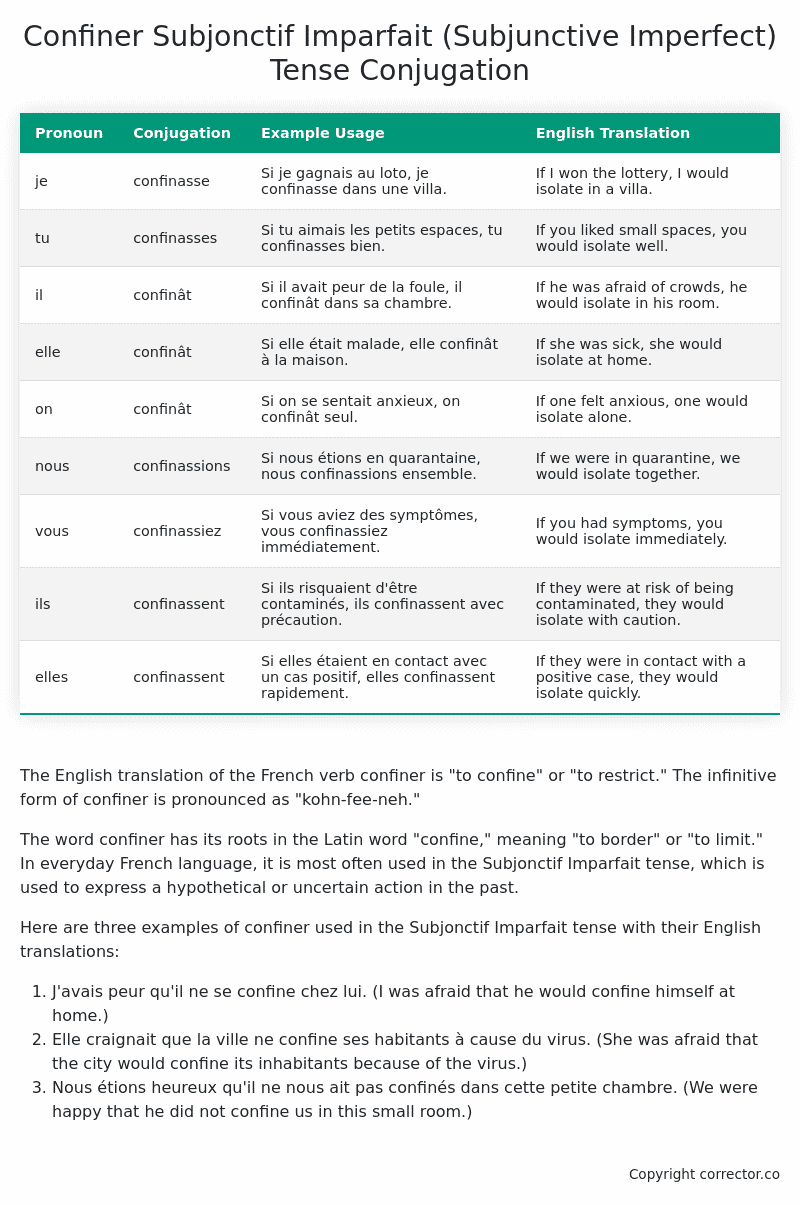Subjonctif Imparfait (Subjunctive Imperfect) Tense Conjugation of the French Verb confiner
Introduction to the verb confiner
The English translation of the French verb confiner is “to confine” or “to restrict.” The infinitive form of confiner is pronounced as “kohn-fee-neh.”
The word confiner has its roots in the Latin word “confine,” meaning “to border” or “to limit.” In everyday French language, it is most often used in the Subjonctif Imparfait tense, which is used to express a hypothetical or uncertain action in the past.
Here are three examples of confiner used in the Subjonctif Imparfait tense with their English translations:
- J’avais peur qu’il ne se confine chez lui. (I was afraid that he would confine himself at home.)
- Elle craignait que la ville ne confine ses habitants à cause du virus. (She was afraid that the city would confine its inhabitants because of the virus.)
- Nous étions heureux qu’il ne nous ait pas confinés dans cette petite chambre. (We were happy that he did not confine us in this small room.)
Table of the Subjonctif Imparfait (Subjunctive Imperfect) Tense Conjugation of confiner
| Pronoun | Conjugation | Example Usage | English Translation |
|---|---|---|---|
| je | confinasse | Si je gagnais au loto, je confinasse dans une villa. | If I won the lottery, I would isolate in a villa. |
| tu | confinasses | Si tu aimais les petits espaces, tu confinasses bien. | If you liked small spaces, you would isolate well. |
| il | confinât | Si il avait peur de la foule, il confinât dans sa chambre. | If he was afraid of crowds, he would isolate in his room. |
| elle | confinât | Si elle était malade, elle confinât à la maison. | If she was sick, she would isolate at home. |
| on | confinât | Si on se sentait anxieux, on confinât seul. | If one felt anxious, one would isolate alone. |
| nous | confinassions | Si nous étions en quarantaine, nous confinassions ensemble. | If we were in quarantine, we would isolate together. |
| vous | confinassiez | Si vous aviez des symptômes, vous confinassiez immédiatement. | If you had symptoms, you would isolate immediately. |
| ils | confinassent | Si ils risquaient d’être contaminés, ils confinassent avec précaution. | If they were at risk of being contaminated, they would isolate with caution. |
| elles | confinassent | Si elles étaient en contact avec un cas positif, elles confinassent rapidement. | If they were in contact with a positive case, they would isolate quickly. |
Other Conjugations for Confiner.
Le Present (Present Tense) Conjugation of the French Verb confiner
Imparfait (Imperfect) Tense Conjugation of the French Verb confiner
Passé Simple (Simple Past) Tense Conjugation of the French Verb confiner
Passé Composé (Present Perfect) Tense Conjugation of the French Verb confiner
Futur Simple (Simple Future) Tense Conjugation of the French Verb confiner
Futur Proche (Near Future) Tense Conjugation of the French Verb confiner
Plus-que-parfait (Pluperfect) Tense Conjugation of the French Verb confiner
Passé Antérieur (Past Anterior) Tense Conjugation of the French Verb confiner
Futur Antérieur (Future Anterior) Tense Conjugation of the French Verb confiner
Subjonctif Présent (Subjunctive Present) Tense Conjugation of the French Verb confiner
Subjonctif Passé (Subjunctive Past) Tense Conjugation of the French Verb confiner
Subjonctif Imparfait (Subjunctive Imperfect) Tense Conjugation of the French Verb confiner (this article)
Subjonctif Plus-que-parfait (Subjunctive Pluperfect) Tense Conjugation of the French Verb confiner
Conditionnel Présent (Conditional Present) Tense Conjugation of the French Verb confiner
Conditionnel Passé (Conditional Past) Tense Conjugation of the French Verb confiner
L’impératif Présent (Imperative Present) Tense Conjugation of the French Verb confiner
L’infinitif Présent (Infinitive Present) Tense Conjugation of the French Verb confiner
Struggling with French verbs or the language in general? Why not use our free French Grammar Checker – no registration required!
Get a FREE Download Study Sheet of this Conjugation 🔥
Simply right click the image below, click “save image” and get your free reference for the confiner Subjonctif Imparfait tense conjugation!

Confiner – About the French Subjonctif Imparfait (Subjunctive Imperfect) Tense
Formation
Common Everyday Usage Patterns
Interactions with Other Tenses
Subjonctif Présent
Indicatif Passé Composé
Conditional
Conditional Perfect
Summary
I hope you enjoyed this article on the verb confiner. Still in a learning mood? Check out another TOTALLY random French verb conjugation!


